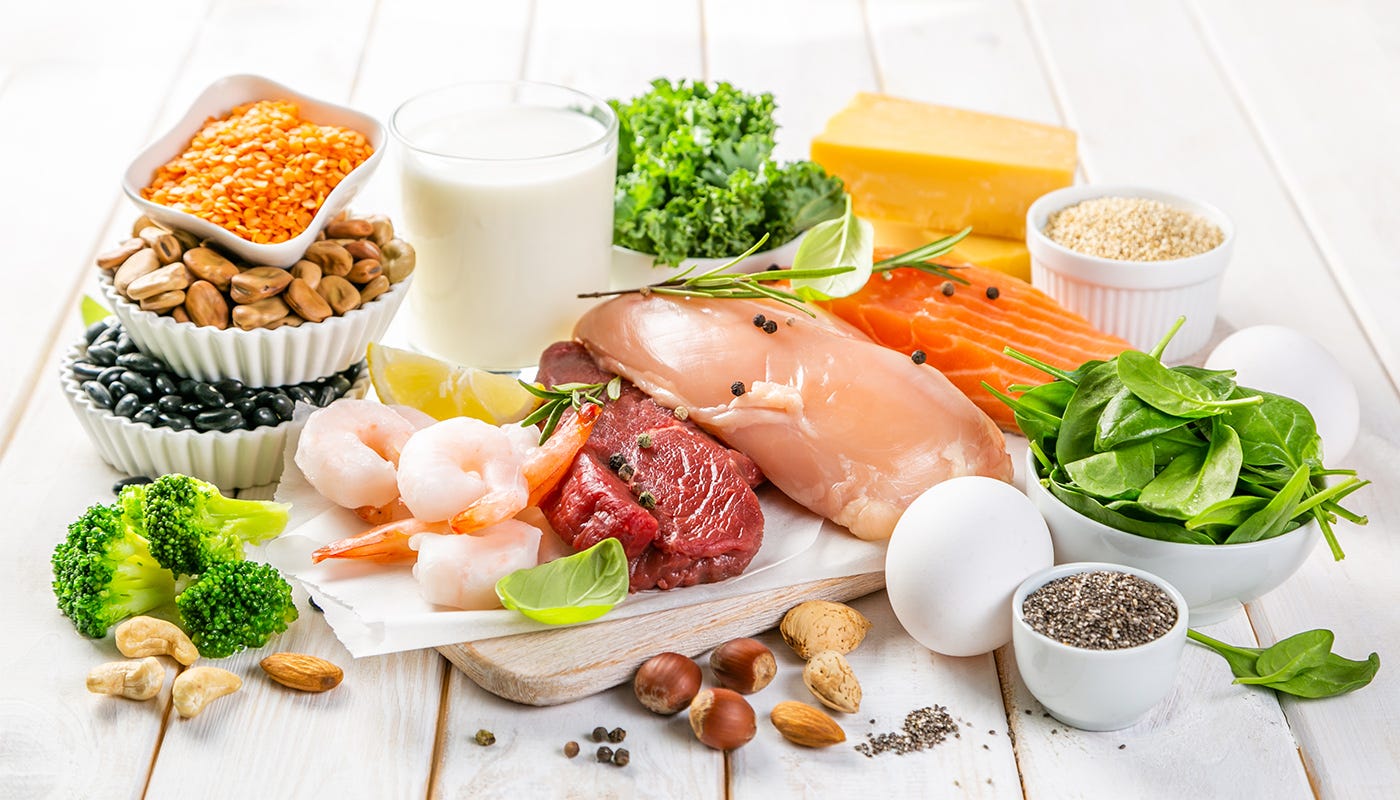PROTEINS
The importance of proteins for our metabolism
The importance of proteins for our metabolism
by Simone Bisello
The importance of proteins in daily nutrition is undeniable, yet the debate over their optimal intake remains open. Protein requirements vary based on numerous factors, including age, body composition, and the level and type of physical activity. Understanding the role of proteins and strategies to optimize their intake is essential to ensure an efficient metabolism and maintain long-term well-being.
What are proteins?
The term "protein" derives from the Greek prōteîos, meaning "primary," highlighting their essential role in life. Proteins are macromolecules composed of chains of amino acids, the "building blocks" of their structure.
There are over 20 different amino acids:
- Essential amino acids (such as Leucine, Isoleucine, Lysine, Valine, and others) must be obtained through diet, as the body cannot synthesize them on its own.
- Non-essential amino acids can be produced by the body from other substrates.
The key role of proteins in metabolism
Proteins are essential macronutrients involved in numerous key biological processes. Beyond their structural and functional roles at the cellular level, their impact on energy metabolism, muscle development, satiety, and weight control makes them fundamental in a balanced nutritional plan.
Here are their main functions:
- Tissue building and repair: proteins are indispensable for tissue synthesis and renewal, particularly muscle. Intense physical activity causes micro-damage to muscle fibers, requiring proteins for repair and strengthening. This process is essential for muscle growth and recovery.
- Metabolism and enzymes: most enzymes regulating biochemical reactions in the body are proteins. Without them, essential processes such as digestion, energy production, and the synthesis of new molecules would not be possible.
- Immune system support: antibodies, crucial for defending against viruses and bacteria, are proteins. An inadequate protein intake can compromise the production of these molecules and weaken the immune system.
- Transport and communication: Specialized proteins transport essential molecules in the bloodstream.
- Energy source: although carbohydrates and lipids are the primary energy sources, in fasting conditions or high metabolic stress, the body can convert amino acids into glucose through gluconeogenesis. However, this mechanism is not ideal, as it can lead to muscle mass loss if protein balance is inadequate.
Additionally, proteins significantly influence weight control and satiety: they promote a longer-lasting feeling of fullness compared to carbohydrates and fats, helping regulate appetite and manage body composition. Maintaining an adequate protein intake is therefore essential not only for muscle growth but for overall bodily function.
Protein sources and nutritional quality
Dietary proteins come from both animal and plant sources. Meat, fish, eggs, dairy, and their derivatives are rich in proteins containing all essential amino acids in the right proportions (classified as high biological value). Legumes, cereals, and nuts offer valid alternatives but have a highly variable amino acid profile, often lacking some essential amino acids. Moreover, the proteins in legumes have lower bioavailability.
The amino acid profile is an important factor in assessing protein quality: in general, animal proteins have a more complete profile than plant proteins. However, by combining different plant sources, a complete amino acid pool can be obtained.
Another crucial factor is digestibility: animal proteins have a bioavailability above 90%, while plant proteins range between 70-80%. To measure protein quality, scientific parameters such as PDCAAS (Protein Digestibility-Corrected Amino Acid Score) and DIAAS (Digestible Indispensable Amino Acid Score) are used, providing a more accurate evaluation of dietary protein quality.
High-quality protein sources: animal or plant-based?
Animal-based proteins (from meat, fish, eggs, dairy, and supplements such as whey protein) are considered more "complete," earning them the term "noble proteins." Additionally, animal sources generally contain a higher protein concentration per serving, meaning that relying solely on plant-based sources requires consuming larger portions, which may lead to excessive carbohydrate intake
On the other hand, plant-based proteins have their own advantages: compared to many animal sources, they are generally lower in saturated fats and richer in fiber. They also provide a variety of antioxidants and phytonutrients that support well-being and protect against cellular damage.
To optimize protein intake, it is essential to choose high-quality protein sources, though no single source is superior in absolute terms.

How much protein should we consume?
Protein requirements vary depending on the individual and metabolic goals. It is important to distinguish between:
- Minimum protein requirement, the amount necessary to maintain vital functions and prevent deficiencies.
- Optimal protein recommendation, which considers adaptive and performance factors, such as muscle growth in athletes.
For the general population, the recommended daily protein intake is 0.8 g per kg of body weight. For example, a 70 kg person should consume at least 55-60 g of protein per day. However, in athletes, protein needs can be higher, reaching up to 2 g per kg of body weight, depending on the type of sport practiced. Endurance athletes, for instance, require approximately 1.65 g/kg, nearly double the recommendation for a sedentary person.
To achieve these intake levels, it is crucial to distribute protein consumption across multiple meals throughout the day for optimal absorption and utilization.
For example:
Breakfast: two eggs (12-14 g of protein) and two slices of whole-grain bread (4 g), totaling 16-18 g of protein.
Lunch: a dish of whole grains with lentils (100 g = 9 g of protein) provides 13 g of protein.
Dinner: 150 g of white meat or fish (30-35 g of protein), accompanied by vegetables and cereals, completes the daily protein intake.
| Food | Proteins (g/100 g) | Carbohydrates (g/100 g) | Calories (Kcal/100 g) |
| Parmigiano reggiano | 33,0 | 0,0 | 392 |
| Chicken brest | 31,0 | 0,0 | 165 |
| Fresh tuna | 30,0 | 0,0 | 144 |
| Whole eggs | 13,0 | 0,8 | 143 |
| Whole milk | 3,2 | 4,8 | 63 |
| Dried lentils | 25,0 | 60,0 | 353 |
| Soybeans (dried) | 36,0 | 30,0 | 446 |
| Dried chickpeas | 19,0 | 61,0 | 364 |
| Dried quinoa | 14,0 | 64,0 | 368 |
If it is difficult to meet daily protein requirements or the protein needs of individual meals through diet alone, we can turn to protein-rich foods such as protein bars, shakes, biscuits, or protein-enriched flakes for breakfast. These foods can supplement the diet and make it easier to reach protein intake goals, especially for those with an active lifestyle or difficulty consuming complete and balanced meals.
In cases of reduced intake or increased demand, high-quality protein supplements can be used.
Conclusions
Proteins are a cornerstone of our diet and metabolism, as they are involved in essential processes ranging from muscle growth to immune function. A balanced protein intake, tailored to individual needs and supported by high-quality sources, is crucial for overall well-being and physical efficiency.
There is no universally "perfect protein"; the key lies in balancing quantity, quality, and distribution to maximize the benefits of one's nutritional plan.
Bibliography
- Leidy, H. J., et al. (2015). "The role of protein in weight loss and maintenance".The American Journal of Clinical Nutrition 101(6), 1320S-1329S. DOI: 10.3945/ajcn.114.100278
- Young, V. R., & Pellett, P. L. (1994). "Protein quality assessment of the protein digestibility-corrected amino acid score (PDCAAS)" The Journal of Nutrition, 124(4), 583S-588S. DOI: 10.1093/jn/124.4.583S.
- Meyer, M., et al. (2019). "Digestible Indispensable Amino Acid Score (DIAAS) for human nutrition: An updated review" Journal of Food Science, 84(9), 2493-2501. DOI: 10.1111/1750-3841.14673.
- Tarnopolsky, M. A., & Phillips, S. M. (2007). "A critical review of protein requirements for endurance athletes" Applied Physiology, Nutrition, and Metabolism, 32(2), 287-298. DOI: 10.1139/H06-186
Disclaimer: the information provided is for informational purposes only and does not replace the advice of your doctor or a qualified healthcare professional. These details are intended for healthy individuals; any dietary plan or physical exercise should be supervised by a legally authorized professional according to Italian law. Enervit S.p.A. assumes no responsibility, as the information is solely for educational purposes. Before undertaking any dietary or physical activity plan, individuals should consult with their trusted specialist.





